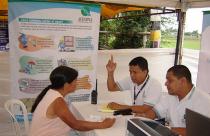It is an integral part of LYSA's approach to apply social engineering principles during its projects, not only for assessing the service demand and population needs but also for the optimal management of water connections, communication with the population with respect to the service, cooperation in all management choices or priorities for action, and even in the participation of the population in the work or in the management and monitoring of certain town district networks.
Social engineering of a drinking water and sanitation project comprises the range of measures taken to accompany change which will make it possible:
- To ensure that the results of the project meet the demands of the drinking water and sanitation users, and that these users are involved in all the important stages of the project
- To build all the relations necessary between the players to ensure they work hand-in-hand, and, where necessary, lay down these relations into formal contracts.
- To ensure that all the conditions are in place so that the services set up in the context of the project are managed in a sustainable manner
- To reinforce the skills of the community players who will be involved in the project performance phase and in the service management phase.
Thus, social engineering goes further than organization in the narrow sense of the term and in all cases presupposes that the organizers are well trained, capable of defining strategies appropriate to each community, of creating or adapting the analysis and training tools and finally are capable of drawing connections between the technical and socio-economic aspects.
In practical terms, whether it is in the support given to an institution for its strategic development or when working in the towns for which it is the water and sanitation operator, LYSA helps and trains its customers to develop social engineering and in particular to foster the emergence of participative solutions which ensure the projects are sustainable in the long term: Involvement of the community in the work, transfer of commercial responsibilities (management of the collective sales outlets, invoicing, debt recovery, fraud detection) and of local communications to local community organizations, creation of the sales representative and social assistance functions for subscribers.

